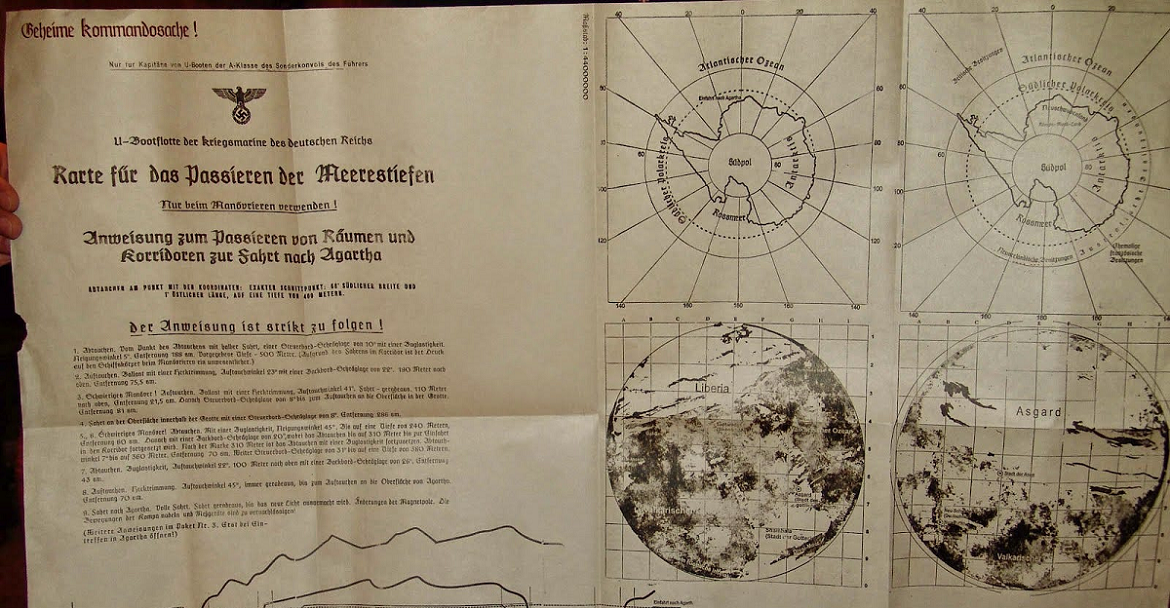Always Trust Your Gut
Fear vs Courage
The Nazis and a Hollow Earth
The Nazi fascination with a hidden world

One of the most bizarre and intriguing aspects of Nazi history is their fascination with the occult and the paranormal. The Nazis believed that they were destined to rule the world, and they sought to uncover any secrets or mysteries that could help them achieve their goal. One of these secrets was the possibility that the Earth was hollow, and that a hidden civilization existed within it.
The hollow Earth theory is not a new idea. It has been proposed by various thinkers and writers for centuries, and it has inspired many works of fiction, such as Jules Verne’s A Journey to the Center of the Earth. The theory suggests that there are openings at the North and South poles that lead to an inner world, where a different sun illuminates a lush landscape inhabited by ancient races or exotic creatures. Some versions of the theory also claim that there is a central sun that rotates and creates the illusion of day and night for the inner dwellers.
The Nazis were particularly interested in the hollow Earth theory because they believed that it was connected to their own origins and destiny. They subscribed to a version of the theory called hohlweltlehre, which means “inverted Earth”. According to this idea, we live on the inside of a hollow sphere, and the stars are actually ice crystals suspended in the air. The Nazis also believed that they were descended from a superior race of Aryans who came from a subterranean realm called Agartha, where they still lived under the rule of a king of the world.
To prove their theory and establish contact with their ancestors, the Nazis launched several expeditions to Antarctica, where they hoped to find an entrance to the inner Earth. The most famous of these expeditions was led by Captain Alfred Ritscher in 1938-1939, who claimed to have discovered a warm lake and ice-free land in an area called Neuschwabenland. The Nazis also allegedly built a secret base there, called Base 211, where they conducted research on advanced technologies such as flying saucers and anti-gravity devices.
There are many rumors and legends about what happened to the Nazi Antarctic mission after World War II. Some say that Hitler and some of his top officials escaped to Base 211 and entered the inner Earth, where they were welcomed by their Aryan brethren. Others say that the Nazis never found an entrance to the inner Earth, and that their base was destroyed by Allied forces or by natural disasters. Still others claim that during World War II, a group of Nazi scientists and soldiers embarked on a secret mission to Antarctica, where they believed they could access the inner earth through a hole in the ice. Their goal was to establish contact with the inhabitants of Agartha.
The evidence for this claim is based on some dubious sources, such as a supposed letter from a U-boat crew member who said he had reached the inner earth and would not return, and some maps that allegedly show the Nazi route to Agartha. These maps also depict the inner earth as a concave sphere, with an inner sun and continents on the opposite side of the surface.
The truth behind these stories is hard to verify, as there is little evidence or documentation to support them. Most historians dismiss them as fantasies or propaganda, and regard the Nazi hollow Earth theory as a pseudoscientific myth. However, some researchers and enthusiasts continue to explore the possibility that there is more to the Nazi Antarctic mission than meets the eye, and that there might be some truth to the existence of an inner world.
Ageism In The Workplace
From Experience to Liability: The Harsh Reality of Job Hunting as an Older Worker
As a programmer with a few years of experience under my belt, I’ve found myself struggling to find work despite having gone on dozens of interviews.
I can’t help but feel like my age has become a significant factor in my inability to land a job. I don’t consider myself old by any means, but with each passing year, I know that my chances of securing employment in the tech industry seem to be dwindling.
During my job search, I’ve come across job postings that I’m excited about, but as soon as I see the salary requirements, I know that I’m not going to be a competitive candidate. It’s not that I have unrealistic expectations of what I should be paid for my skills and experience, but I do think that there’s a certain level of compensation that I should be receiving if I’m going to be working full-time.
The worst part about all of this is that I’ve been on so many interviews that I know I’m a skilled programmer. I’m confident in my abilities, I’ve worked on significant projects, and I’m continuously learning and growing. But for some reason, my age and salary requirements seem to be holding me back.
I’ve started to feel like companies are only interested in hiring fresh-faced college graduates that they can groom and shape rather than hiring someone with experience who might shake things up. I understand that every organization is different, but it’s challenging not to feel discouraged when I have dozens of interviews under my belt without any offers.
At this point, I’m not sure what to do. I need to find work, but I don’t want to settle for a job that doesn’t compensate me fairly or utilize my skills and experience. It’s as if I’m trapped in this vicious cycle of being too old and too experienced for some jobs but not qualified enough or too expensive for others.
I believe that age and salary requirements should not be the sole determinants of an individual’s worth or qualifications. The tech industry needs to start valuing the skills and experience of seasoned professionals and offer them fair compensation. I’m not giving up on my job search, but it’s frustrating to see companies overlooking experienced, skilled professionals like myself because of outdated or misplaced beliefs about age and salary.



